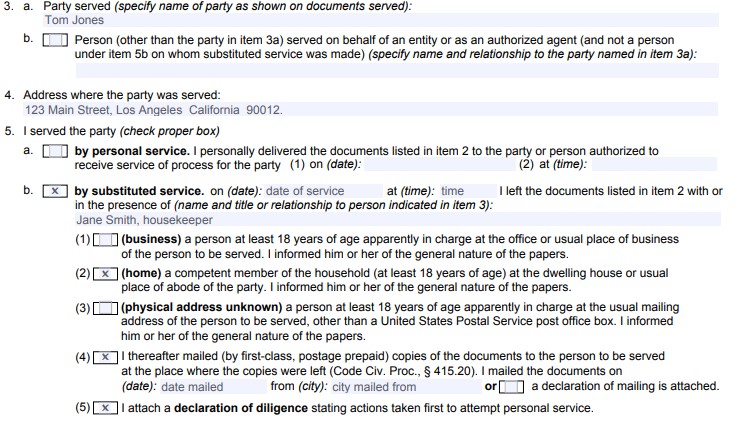6-07/640.00 Individuals and All Other Defendants
ARTICLE 4 of the Code of Civil Procedure - Persons Upon Whom Summons May Be Served [416.10 - 416.90] – covers parties to whom a summons is to be served. However, a Natural Person is not specifically mentioned. Therefore, service on a Natural person or any other defendant not specifically mentioned is covered under CCP 416.90.
Before a summons against an individual is assigned out for service, the “Notice to the Person Served” at the bottom of the summons shall be completed by checking the box “as an individual defendant.”

When completing the Proof of Service, be sure to include all information regarding the person served and the manner of such service. EXAMPLE: “Serve Tom Jones.” The process server makes contact with Tom Jones. The Proof of Service should state the party served: Tom Jones. The address of the service must appear on the Proof of Service. You must indicate the manner of service as personal (CCP 415.10).

If the service is made by substitution (CCP 415.20), you must include the name and title or relationship. The party must be informed of the general nature of the process. The name of the party must still be indicated. A copy of the Summons and Complaint must be mailed to the Party served. Service by substitution must show attempts (diligence). Dates and times of all previous attempts of service declaration of diligence must documented on the Proof of Service. The declaration of diligence will be on an attached page.

Where a summons is served on an individual by serving a person authorized by that person to receive service of process is somewhat tricky matter and care should be made when completing service. A May 14, 1990, opinion from County Counsel stated service of an “authorized person” in reference to CCP 416.90 should only be used after cautious determination as to who is authorized to accept service of process for another. Each situation will require a determination by the process server. Although a relationship with the defendant may be close there may not be such an authorization to accept service. An attorney is not necessarily considered an agent authorized to accept service on behalf of his client. (Wilson v. Eddy, 2 CA APP 3d 613) However, based on facts, the attorney may be. (Warner Brothers Records, Inc. v. Golden West Music Sales, 36 CA APP 3d 1012, 112 CA APP 71) Similarly, a wife cannot be determined to be authorized even if she promises to give the process to the husband. (Steinbeck v. Buck, 307 CA App 2d 970)
Do not solicit a party to be authorized. If the plaintiff’s instructions specifically mention a person authorized to accept service on behalf of the individual, you must still establish facts to validate the authorization. If the party with whom you make contact specifically indicates they were authorized to accept service on behalf of the individual, service may be completed by leaving the summons with the authorized person. Service by this method is considered personal service. Please note: an authorized person in reference to CCP 416.90 is not an Authorized Agent. An Authorized Agent is one designated by an artificial person and is registered with the Secretary of State.
If service is made by serving an authorized person, the process server must amend the “Notice to the Person Served” at the bottom of the summons. The amendment must line through 1. As an individual defendant, and shall be completed by (1) inserting the name of the defendant individual after the words “on behalf of” and (2) checking the box “CCP 416.90 (Individual).” If such notice does not appear on the copy of the summons served, no default may be taken against such corporation or unincorporated association or against such person individually, as the case may be. (MJS Enterprises, Inc. v. Superior Court (Serpa) (1984) 153 Cal.App.3d 555 , 200 Cal.Rptr. 286)

When serving an “authorized person”, the following information must be included in the Proof of Service.
- Full name of the person who states he/she is authorized to accept service of process;
- Relationship to the individual defendant; and
- Statement that he/she is authorized to accept service of process and why
Include all information regarding the person served and the manner of such service. EXAMPLE: “Serve Tom Jones. Tom Jones has authorized William Tell to accept service on his behalf.” The process server makes contact with William Tell who confirms Tom Jones indeed authorize him to accept service of process. The Proof of Service should state the party served: Tom Jones by serving William Tell who stated he was authorized to accept process on behalf of the defendant. The address of the service must appear on the Proof of Service. You must indicate the manner of service as personal (CCP 415.10).

Service upon an authorized person shall not be attempted by substitute service, (CCP 415.20). There is no reasonable feasibility in verifying an authorized person without making contact with the authorized person.